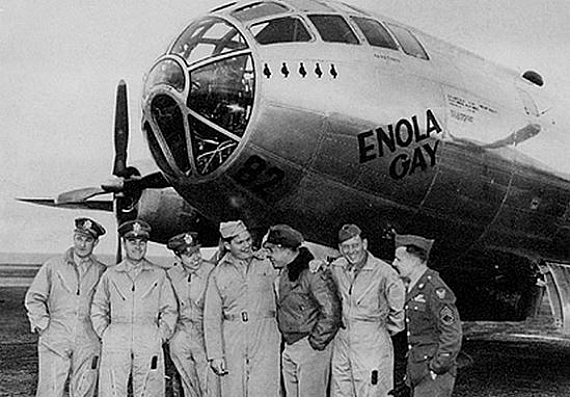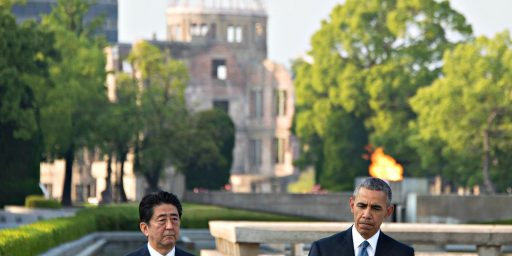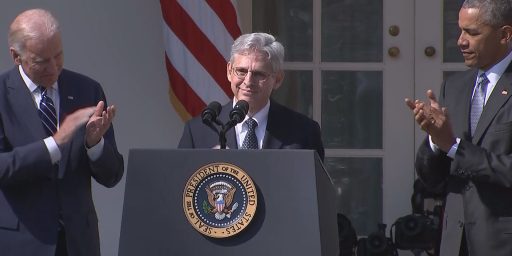Theodore Van Kirk, Last Surviving Member Of Enola Gay Crew, Dies At 93
The last surviving member of the crew that piloted the Enola Gay on August 6, 1945 when it dropped the first atomic bomb used in war in history on Hiroshima, Japan, has died at the age of 93:
Theodore (Dutch) Van Kirk, the navigator and last surviving crew member of the Enola Gay, the B-29 Superfortress that dropped the atomic bomb on Hiroshima in the last days of World War II, died on Monday at his home in Stone Mountain, Ga. He was 93.
His son Thomas confirmed the death.
In the predawn hours of Aug. 6, 1945, the Enola Gay, piloted by Col. Paul W. Tibbets Jr. and carrying a crew of 12, took off from Tinian in the Mariana Islands with a uranium bomb built under extraordinary secrecy in the vast Manhattan Project.
Captain Van Kirk spread out his navigation charts on a small table behind Colonel Tibbets’s seat. From that spot, at the end of a long tunnel atop the bomb bays, he took the plane’s bearings, using a hand-held sextant to guide with the stars.
When the Enola Gay reached Iwo Jima as the sun rose, it began an ascent to 31,000 feet. At 8:15 a.m. Japan time, it reached Hiroshima, a city of 250,000 and the site of an important army headquarters.
The bombardier, Maj. Thomas W. Ferebee, said, “I got it,” announcing that the Enola Gay was over his aiming point, the T-shaped Aioi Bridge. Captain Van Kirk, who had also familiarized himself with Hiroshima’s landmarks, leaned over Major Ferebee’s shoulder and confirmed he was correct. His navigating skills had brought the Enola Gay to its target only a few seconds behind schedule at the conclusion of a six-and-a-half-hour flight.
Major Ferebee released the bomb, known as Little Boy, and 43 seconds later, at 1,890 feet above ground zero, it exploded in a nuclear inferno, leaving tens of thousands dead or dying and turning Hiroshima into scorched devastation.
Colonel Tibbets executed a diving turn to avoid the blast effects, but the Enola Gay was buffeted by a pair of shock waves. A flash of light that Mr. Van Kirk likened to a photographer’s flashbulb engulfed the cabin.
“The plane jumped and made a sound like sheet metal snapping,” Mr. Van Kirk told The New York Times on the 50th anniversary of the Hiroshima raid. “Shortly after the second wave, we turned to where we could look out and see the cloud, where the city of Hiroshima had been.”
He added: “The entire city was covered with smoke and dust and dirt. I describe it looking like a pot of black, boiling tar. You could see some fires burning on the edge of the city.”
Mr. Van Kirk remembered “a sense of relief.”
“Even though you were still up there in the air and no one else in the world knew what had happened, you just sort of had a sense that the war was over, or would be soon,” he told Bob Greene in Mr. Greene’s 2000 book, “Duty.”
Shortly before 3 p.m., the crewmen returned to Tinian and were greeted, as Mr. Van Kirk told it, by “more generals and admirals than I had ever seen in one place in my life.”
(…)
The crews that dropped the atomic bombs on Hiroshima and Nagasaki were seen by Americans as saviors for ending the war. But over the years, the morality of atomic warfare and the need for the bombings has been questioned.
Mr. Van Kirk joined his fellow crewmen in unwavering defense of the atomic raids.
“We were fighting an enemy that had a reputation for never surrendering, never accepting defeat,” he said. “It’s really hard to talk about morality and war in the same sentence.”
He continued: “Where was the morality in the bombing of Coventry, or the bombing of Dresden, or the Bataan Death March, or the Rape of Nanking, or the bombing of Pearl Harbor? I believe that when you’re in a war, a nation must have the courage to do what it must to win the war with a minimum loss of lives.”
Kirk is right, of course, and he deserves thanks for the service he provided to his country. Somewhat ironically, in one week, we will mark the 69th anniversary of the bombing of Hiroshima.







My mother’s cousin, Richard Nelson, was the radio operator on the Enola Gay. I remember he used to come and visit us when I was growing up to talk to my father, another decorated WWII veteran, when he was in Portland. The entire crew got together one a year but over the years those get togethers got smaller and smaller. He died in his mid 70s. He chain smoked a drank a lot although it should be noted he came from hard drinking Swedish Family.
When he was accepted into the program he couldn’t tell his parents what he was doing or even where he was at. Any letters he sent home were always heavily redacted.
Death of a war criminal.
@Anderson: I think Hiroshima could almost be justified and it was no worse than the fire bombing of Dresden. The general consensus in Japan was it saved Japanese lives by ending the war because all of the Japanese were starving.
Nagasaki not so much, it was primarily a message to Stalin as the war was nearly over already.
@Anderson: I guess you feel the same way about the pilots who bombed London, Dresden and Tokyo to name a few? Or does atomic bombing hold a special place of condemnation?
@Ron Beasley:
I’ve not heard that specific argument, but the numbers argument that convinced me the atomic bombings were justifiable in terms of saving lives (not necessarily justified) was that the proposed ground invasion of Japan would have run right into where the Japanese would have planned their defenses, and the ensuing bloodbath would have eclipsed Hiroshima and Nagasaki in total deaths by an order of magnitude. Sure, more American dead, but vastly more Japanese dead as well.
Given the fact that the alternative to Hiroshima and Nagasaki was an invasion that would have killed far more Japanese, civilian and military. The idea that the crew of the Enola Gay, or anyone else connected with the events of August 6, 1945 is a “war criminal” is utterly absurd.
In response to the war criminal accusation, could anyone brief me on what the applicable international laws were at that time?
I’m just interested in the technical argument here, I’ve always been convinced it saved lives overall. More than likely it even saved civilian lives overall.
@Doug Mataconis: That’s what we keep saying, anyway. There were moves to surrender. No way to know what would have happened. Maybe it was necessary and moral, maybe not. Given the situation, once the bomb became available, it was inevitable it would be used.
I would hardly go as far as @Anderson: However, several years ago Max Hastings wrote a history of the British bombing campaign, Bomber Command. He prefaced it by saying that whatever he said about higher command, nothing should be taken as disrespect for the aircrew. He did regard “Bomber” Harris as a war criminal and concluded that the primary strategic effect of the campaign was to kill off 50,000 of the cream of the British manpower pool.
@Franklin: The way I understand it, World War II was the first total war that involved actively attacking population centers with weapons of mass destruction. (Compared to what you could get away with technology-wise in past wars, bombs dropping houseloads of bombs were WMDs.) There was a ban against using gas attacks, but that’s as far as I know.
@Tillman: It was the first war with weapons of mass destruction, at least launchable ones. Humanity’s record toward civilian population centers during war time has never been good.
As an accomplished, military historian, having traveled/lived at some of the bloodiest, WWII Pacific Theater sites, it was -conservatively- estimated that one MILLION allied lives would be lost to invade Japan, not counting Japanese lives. Many of you modern lib-tards would have never been born, since your fathers & grandfathers would be DEAD! Think! Suicide bombers, and using humans as shields, (placing hospitals & schools near prime, military, targets) was perfected to a fine art by Japan, then. Hamas, the Taliban, ISIS, and Obama’s Muslim Brotherhood pals are just copycats. As early as April, ’42, Japanese forces set-up a hospital right on the beach, across from Corregidor, filled w/ agonizing American & Filipino prisoners. Around the hospital, close-in, Japan placed shore batteries to rain fire on ‘The Rock’ , across the strait. Add that the allied, Corregidor Hospital, w/ a HUGE red/white cross on the roof was repeatedly bombed/strafed by the Japanese Navy, similar to what they had recently performed, in the Oahu-Pear Harbor attacks. I am thankful that today, Japan is a firm friend, and stout ally, bravely countering a more dangerous, Pacific, bully, the PRC. Also, that my father did not have depart Manila, for mainland Japan, in 1945. You should consider likewise. Cavhorse
@Tillman:
…the hell…
Those two days in August 1945 weren’t the worst of the war. I believe that more civilians died on one day in Tokyo under US bombings, and there was more explosive power dropped on Dresden in one day than on Hiroshima or Nagasaki. Dresden…it’s easier to argue that those bombings constituted a war crime than the bombings over Japan. Dresden wasn’t on the way toward Berlin, it wasn’t a military target, I don’t think it was even much of a manufacturing center. It was bombed mainly to break Germany’s spirit, and it’s very hard to justify bombing civilians for that purpose. (In fact, it’s much more like an act of terrorism.) Hiroshima had an important military base. Nagasaki’s harder to justify.
These guys did the same job as any other bomber crew, they dropped munitions that killed people. I can’t see any reasonable argument that would lead one to conclude that they were “war criminals.”
@Cavhorse:
If indiscriminate attacks on civilians are a legitimate miltary tactic, what exactly is our complaint with Hamas?
Killing thousands of civilians for the purpose of terrorizing the enemy into surrender is a war crime, if anything’s a war crime.
I realize this is a controversial position, because the “good guys” were also the masters of carpet bombing, but yes, Hamburg, Dresden, Tokyo, Hiroshima, and Nagasaki were war crimes.
I take it as a given that no one disagreeing with me has any criticism of Israel’s current activities in Gaza, for instance.
… Also, to correct Doug’s error above, there was not a single alternative to bombing Japanese cities into ash, i.e. invasion.
Naval blockade had been the USN’s supposition as to how the campaign vs. Japan would end; this was overridden by the MacArthur/Army faction, and the atomic bombs made that debate moot in any event.
Now, blockade tends itself to target civilians, particularly the most vulnerable to starvation, so its legal status is itself debatable. I would submit however that it was far less objectionable than burning men, women, and children to death in a mass holocaust (small “h”).
@Tillman:
The Hague Conventions also banned the bombardment of undefended civilians. The conventions predate the invention of airplanes, so aerial bombing is not explicitly included in the definition of bombardment (naval artillery, field artillery, or siege weapons), but I don’t think it’s much of a stretch to argue strategic bombing would qualify.
The argument then becomes one over when a civilian is considered “defended” when an entire city is being targeted.
@Anderson:
It should also be pointed out that it’s hard for the US to claim it’s goal was to end the war with minimal casualities when in July it participated in the Pottsdam Declaration that categorically rejected any sort of negotiated surrender.
As a thought experiment, suppose that instead of our bombing Japanese cities, Japan had exploded an A-bomb over Los Angeles, yet somehow gone on to lose the war (maybe couldn’t produce any more bombs).
Does anyone doubt that this would have been treated as a war crime in the Allies’ postwar tribunals?
@Anderson: @Anderson: I’d make a distinction between the act, ordered by others, which arguably could be regarded with 100% hindsight as a war crime; and the navigator, Van Kirk, who I can’t really see as a criminal. (I know, “I was just following orders.”, but still.) The fact is, had I been in Truman’s shoes, I would have dropped it.
And yes Doug is in error, @Cavhorse: far more so, for believing he knows for a fact what would have happened had we not dropped the bomb. Or, as was proposed, demoed the bomb in an uninhabited area and delivered an ultimatum.
@Stormy Dragon: Given the purposes behind unconditional surrender (the specter of 1918 all over again), I think there were valid military considerations behind it. But unconditional surrender doesn’t mean unconditional warfare.
.. Anyone who’s interested could do much worse than to read Richard Frank’s book Downfall, which lays out the bombing, blockade, and invasion plans and tells the history of the final days of the war from the burning of Tokyo in March 1945 to Nagasaki. His conclusions are much less unconventional than mine – he’s writing mainly to counter the notion that we dropped the Bomb to impress the Soviets rather than because Japan was intransigent – but it’s a well-researched and useful book.
@gVOR08: One fear about a demo was that the damn thing might not have worked. Remember, the design for the Hiroshima bomb was only field-tested at Hiroshima (it seemed foolproof to the scientists).
Politicians and general trying to make these decisions were still a bit leery of the science-fiction gadgets being promoted to them by Groves and the atomic scientists.
As for “just following orders,” well, to state it is sufficient. As for doing what Truman did, I might have too … but that doesn’t make it not a crime.
Oh, and Cavhorse, Frank’s book also addresses the inflated casualty figures for Olympic or whatever the codename was by then. Not that it would’ve been a cakewalk.
@Anderson:
And if anyone thinks that the specter of 1918 is that we were too lenient with Germany at the end of WWI, they didn’t actually learn anything from the specter of 1918.
Not the leniency, but the fact that the Germans were apparently able to convince themselves that they didn’t “really” lose the war. That at least was not a problem in 1945.
@Stormy Dragon: You are so right. If anything the draconian reparations required of Germany were directly responsible for the rise of Hitler and WWII. The US learned that lesson and hence the Marshall Plan.
Considering the secrecy of the project and the fact that this was the first tactical use of the A-bomb, isn’t it possible that the Enola Gay crew had little intuitive grasp of the scope of destructive power the bomb would have?
@jd: From what I understand most of them did not my mothers cousin Richard Nelson certainly didn’t but then he was just a 20 year old PFC and really didn’t have the need to know.
The crew knew they were dropping a single super-bomb that would destroy a city and whose blast they needed to veer the hell away from. Whether they understood atomic fission is moot.
@gVOR08: You’re correct about Hastings’ conclusion. One point of difference is that Sir Arthur Harris was convinced (in the absence of much evidence to support his position) that area bombing could degrade Germany’s war effort. It was only when the Americans and British decided to go after Germany’s fuel supplies and transportation infrastructure that strategic bombing became effective. The ENOLA GAY was just the straw that Japanese who wanted to make peace needed to overpower the Japanese leaders who had a death wish, which they could have gratified at the cost of 3 or 4 million dead.
@SC_Birdflyte: As I recall the history, the RAF started night area bombing because they lacked the technical and material resources to do anything else, and the British were desperate to do something, anything. Harris’s real sin was to continue area bombing after the RAF became able to perform targeted attacks on fuel, transport, and production facilities in daylight.
I pulled up the Wiki page on the US Strategic Bombing Survey and found:
@Anderson:
This is not a technical argument, if you were replying to me.
@Stormy Dragon:
This is.
About 12 years ago, I worked as an anesthesiologist on Saipan and I took a trip to Tinian. I rode my bicycle around the island and found the site where the Enola Gay had Little Boy loaded into its bomb bay. Just next to it is the spot where the 2nd nuclear bomb, Fat Boy, was loaded into the B-29 “Bockscar”. There is a little memorial at each site, which are within vast and very deserted airfields.
My grandfather, who served with the 6th Marines on Guadalcanal, Guam, and Okinawa, alway said that the atomic bombs were a godsend, and that those bombs saved many American and Japanese lives. And while he was just a regular guy, just off a Minnesota farm, I think he learned a few things while serving as a Marine and knew the consequences of war. Dead bodies and all.
David Irving on the REAL history of the terrorflieger bombings of both Dresden and Hiroshima/Nagasaki.
Where Have All the Flowers Gone? Marlene Dietrich
https://www.youtube.com/watch?v=-9t7LbNpQcE
Wonder what punishment the afterlife has for him for his hineous war crimes. May he always be remembered with shame.
@Anderson: I couldn’t agree more. It’s a shame that one of the worst mass murderers in history get any honor at all.
Why not go after the REAL war criminal cabal that plotted US entry into the European civil war with the promise that Lord Balfour would give deed and title of Palestine to the Zionists at the 1919 Paris Peace Conference? Members of that same cabal became members of FDR’s Brain trust that lied the US into WWII. One particular scoundrel, Ben Victor Cohen–Wilsons personal representative and lead counsel of the World Zionist Council–later became FDR’s “Kissinger,” laying the legal groundwork to overturn the US Neutrality Act that allowed FDR to arm Churchill(destroyers for bases) and Stalin’s Red Army and air forces(Bell Air’s P=39s).
While much of Cohen’s shennagins remain state secrets in the US and British archives , author William Lasser–Ben V, Cohen : Architect of the New Deal– does a great job at revealing Cohen’s work that led to the creation of The 1920 Balfour Declaration, the Dumbarton Agreements, the UN, Potsdam agreements, the ICC at the Hague… . Cohen also had developed a Morgenthau Plan of his own. Cohen destroyed his own personal papers and correspondence.
http://www.fpp.co.uk/History/Churchill/Weizmann_Zionists/WSC_100941.html